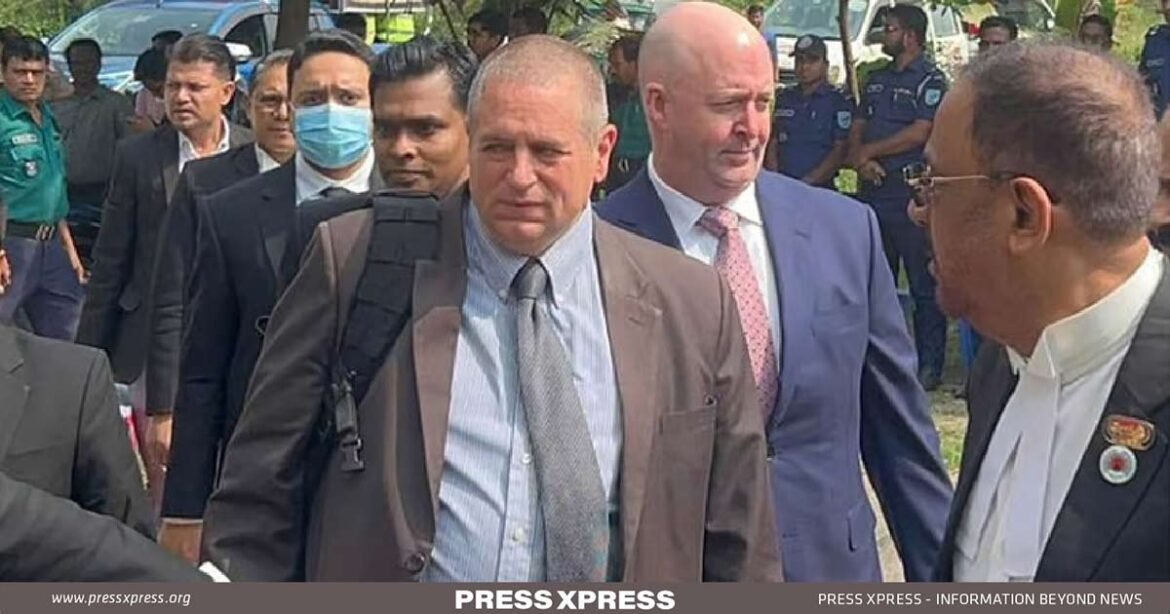Lloyd Schwepp, a Canadian Royal Police member, has taken the stand as a witness in the Niko corruption case involving BNP Chairperson Khaleda Zia. He commenced his testimony yesterday, October 30.
In his statement, he claimed that officials from the former government played a role in promoting corruption at the Canadian oil and gas exploration company Niko. Charges of corruption in Canada have been brought against Niko Resources, with allegations of bribery from Niko at the center of the case.
Before this, Cabin Duggan and Lloyd Schwepp, both members of the Canadian Royal Police, arrived at the Keraniganj temporary court on Monday at 11:00 am. Judge Sheikh Hafizur Rahman of Dhaka No. 9 Special Judge Court recorded their statements. Following that, they underwent questioning from the defense attorneys.
On December 9, 2007, the Anti-Corruption Commission (ACC) initiated legal proceedings by filing a case against Khaleda Zia and five individuals, accusing them of corruption and causing a substantial financial loss of approximately 13,777 crore taka to the state due to their involvement in a contract with the Canadian company Niko.
Subsequently, in May 2018, a formal charge sheet was submitted against Khaleda Zia, along with 11 other co-accused, in a court of law. It was on March 19 that the court formally framed charges against eight individuals, including Khaleda Zia, in connection with this case, marking the commencement of the testimonial phase of the legal proceedings.
Backstory of NIKO graft case
Niko initially sought entry into the Bangladesh energy market in 1997. Nevertheless, the government, led by the Awami League at the time, enlisted the services of international consultants Arthur Andersen, who determined that Niko lacked the technical and financial qualifications necessary for gas field exploration in Bangladesh.
The Awami League government held a firm stance that gas field allocations should exclusively be made through a competitive bidding process. However, by mid-2001, when the Awami League’s tenure came to an end, Niko had not secured any gas fields in Bangladesh. Until 2003, the position taken by the outgoing government enjoyed unanimous support from all pertinent BAPEX and Petrobangla officials and geologists. Not a single individual was in favor of awarding gas fields to Niko.
However, just two years after the BNP took office, on October 16, 2003, this very company successfully secured a profitable joint venture with BAPEX, the state-owned gas company. With this agreement, Niko gained control over two extensive gas fields, one located in Chattak, Tengratila, and the other in Feni, boasting a potential worth of approximately $750 million.
On January 7, 2005, during drilling operations in the Chattak gas field, Niko triggered a massive blowout, resulting in the destruction of both the gas field and its surrounding environment. While attempting to control the initial blowout, Niko inadvertently triggered a second explosion on June 24 of that year.
Exposing a Corruption Network
The first case of corruption involving Niko became public in June 2005 when news reports unveiled that Niko had gifted a luxury car to AKM Mosharraf Hossain, who was serving as the Bangladeshi Minister for Energy at the time. This event prompted the Canadian High Commissioner in Bangladesh, David Sproule, at the time to notify the Canadian Department of Foreign Affairs and International Trade. Subsequently, the Royal Canadian Mountain Police (RCMP) was informed about Niko’s involvement in corrupt activities in Bangladesh.
Despite the widespread condemnation of Niko’s corrupt practices and its role in causing the blowouts, Niko somehow secured a gas purchase and sales agreement with Petrobangla in the waning days of the BNP-led government in 2006. After the BNP regime concluded in 2007, a collaborative international investigation by the RCMP, FBI, and ACC brought to light a complex network of corruption that implicated high-ranking members of the BNP government in power.
Businessmen were hired by Niko to bribe corrupt officials and politically powerful figures to secure its natural gas contracts. Former law minister Moudud Ahmed was implicated by the evidence. It came to light that the joint venture agreement of 2003 was granted to Niko by then-prime minister Khaleda Zia, relying on legal opinions from Moudud Ahmed and his law firm, Moudud Ahmed and Associates. Both opinions asserted that Chattak East was a marginal and abandoned field, despite geological evidence suggesting that it was an unexplored gas field with a potentially substantial gas reserve.
The FBI tracked a series of money transfers that originated in Niko’s Canadian bank account and extended through Niko’s Cayman Islands account, with an intermediary stop at Niko Barbados’s First Caribbean International Bank, culminating in the deposit of funds into Qasim Sharif’s Union Bancaire Privée (UBP) account in Switzerland. An account payee cheque traced from Selim Bhuiyan to Giasuddin Al Mamoon by the RCMP and the FBI revealed Mamoon’s admission to acting as a sub-agent for Niko. This was a critical step in securing the gas fields from Begum Khaleda Zia.
Niko’s contracts in Bangladesh were declared null and void by the High Court Division of the Supreme Court of Bangladesh on the basis of corruption allegations. Three of the accused in the case- AKM Mosharraf Hossain and Moudud Ahmed, former state minister for energy and law minister, respectively, had already died, leading to the removal of their names from the list of charges. Meanwhile, Khaleda Zia, who faces accusations in 33 additional cases, has been sentenced differently in two separate cases, one of which is the Zia Charitable Trust Graft case.


